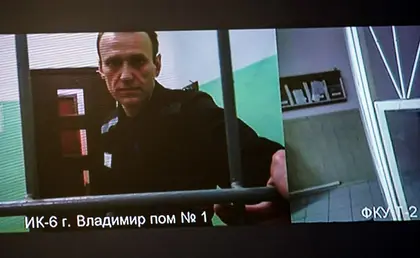Russian opposition leader Alexei Navalny died Friday at the Arctic prison colony where he was serving a 19-year term, Russia's federal penitentiary service said in a statement.
"Navalny felt bad after a walk, almost immediately losing consciousness. Medical staff arrived immediately and an ambulance team was called," stated the FSIN in a release.
JOIN US ON TELEGRAM
Follow our coverage of the war on the @Kyivpost_official.
"Resuscitation measures were carried out, which did not yield positive results. Paramedics confirmed the death of the convict. The causes of death are being established," the statement reads.
According to an RT source, the cause of Navalny's death was a detached blood clot.
The 47-year-old was Russia's most prominent opposition leader and won a huge following with his criticism of corruption in Vladimir Putin's Russia.
Russia's Investigative Committee said it had opened an investigation into the death. Navalny's press secretary Kira Yarmysh said his team had not been informed of his death.
"The Federal Penitentiary Service for the Yamalo-Nenets District has shared news about Navalny's death in IK-3, but we're still waiting for confirmation. Alexei's lawyer is on the way to Kharp," she wrote.
On February 14, Navalny's press secretary, Kira Yarmysh, reported that Navalny had been sent to a punishment cell (SHIZO) for the 27th time during his imprisonment.
Navalny was 47 years old.
Citing his spokesman, Russian news agencies reported that Putin had been informed of Navalny's death.

Russia Used Social Media to Meddle in 2024’s US Presidential Election
Western governments and Russian opposition figures on Friday said the Kremlin was responsible for his death.
Latvia's president said he had been "brutally murdered by the Kremlin".
"The Russian government bears a heavy responsibility," Norway's Foreign Minister Espen Barth Eide wrote on X, formerly Twitter.
France's foreign minister said Navalny had paid with his life for resisting oppression.
- Opposition leader -
Navalny's exposes, posted on his YouTube channel racked up millions of views and brought tens of thousands of Russians to the streets, despite Russia's harsh anti-protests laws.
He was jailed in early 2021 after returning to Russia from Germany, where he was recuperating from a near-fatal poisoning attack with Novichok, a Soviet-era nerve agent.
In a string of cases he was sentenced to 19 years in prison on charges widely condemned by independent rights groups and in the West as retribution for his opposition to the Kremlin.
His return to Russia despite facing jail put him on a collision course with Putin, after Navalny blamed the poisoning attack in Siberia on the Kremlin.
"I'm not afraid and I call on you not to be afraid," he said in an appeal to supporters as he landed in Moscow, moments before being detained on charges linked to an old fraud conviction.
His 2021 arrest spurred some of the largest demonstrations Russia had seen in decades, and thousands were detained at rallies nationwide calling for his release.
In prison, Navalny's team said he had been harassed and repeatedly moved to a punitive solitary confinement cell.
He said guards had subjected him and other inmates to "torture by Putin", making them listen to the president's speeches.
From behind bars he was a staunch opponent of Moscow's full-scale military offensive against Ukraine.
The Kremlin moved to dismantle his organisation, locking up his allies and sending dozens of others into exile.
Late last year he was moved to a remove Arctic prison colony in Russia's Yamalo-Nenets region in northern Siberia.
The last post on Navalny's Telegram channel, which he managed through his lawyers and team in exile, was a tribute to his wife, Yulia Navalnaya, posted on Valentine's Day.
"Baby, you and I have everything like in the song: cities between us, airfield take-off lights, blue snowstorms and thousands of kilometers. But I feel that you are there every second, and I love you more and more," Navalny wrote in his last message.
You can also highlight the text and press Ctrl + Enter






